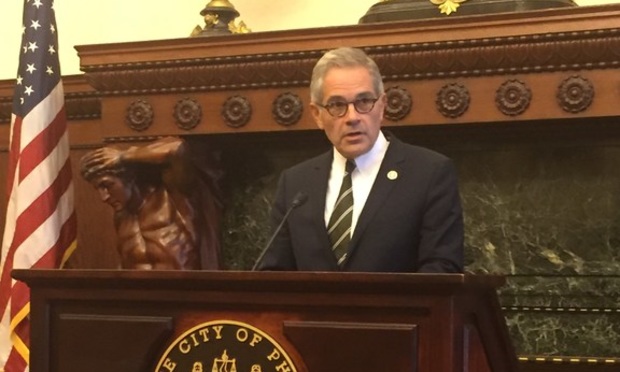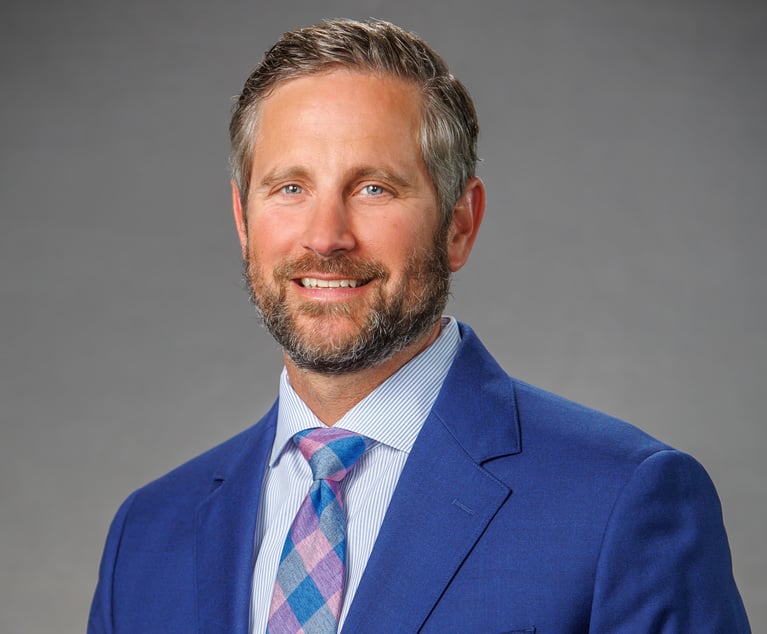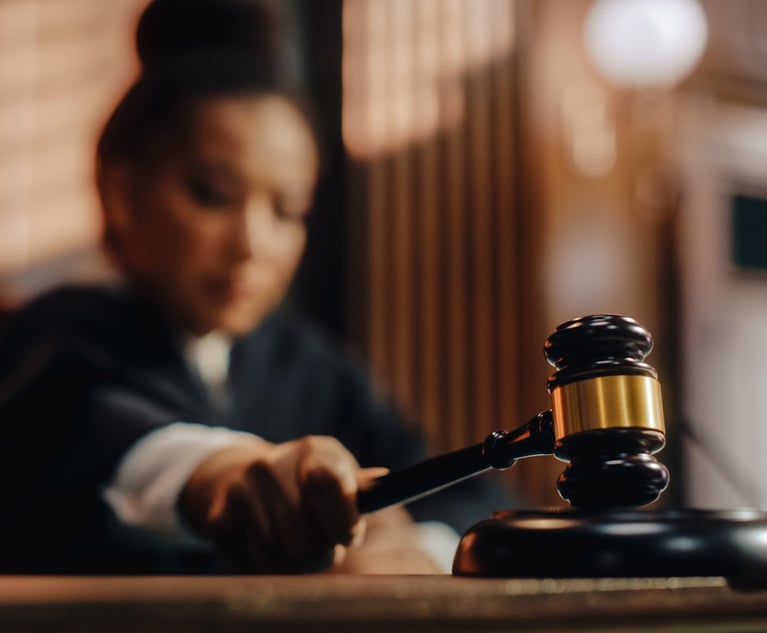Criminal Filings Decreased During Krasner's First Year as District Attorney
According to the statistics obtained by The Legal, the total number of cases filed during 2018 was 38,303, which is a nearly 18 percent drop from the 46,623 cases that were filed in 2017.
January 04, 2019 at 05:17 PM
7 minute read
 Philadelphia District Attorney Larry Krasner. (Photo: P.J. D'Annunzio/ALM)
Philadelphia District Attorney Larry Krasner. (Photo: P.J. D'Annunzio/ALM)
When Philadelphia lawyers discuss the successes and failures of District Attorney Larry Krasner's first year as Philadelphia's top law enforcement officer, it's hard to find consensus. But there is one point of agreement: the Criminal Justice Center seems to be a much quieter place than it was in previous years.
Recent numbers from the District Attorney's Office tallying the number of cases filed in the past year appear to support that impression.
According to the statistics obtained by The Legal, the total number of cases filed during 2018 was 38,303, which is a nearly 18 percent drop from the 46,623 cases that were filed in 2017.
The biggest drop came in the misdemeanor category, with 4,647 fewer cases being filed. According to the numbers, 18,430 misdemeanor cases were filed in 2017 and 13,783 were filed in 2018. Nearly 2,500 fewer felonies were also filed in 2018 compared with the year before, with 17,976 being filed in 2017 and 15,524 being filed in 2018.
The number of homicide cases filed in 2018 also dropped by 34, from 317 filed in 2017 to 283 in 2018. Nearly 1,190 fewer summary offenses were also filed in 2018 from the 9,900 that were filed in 2017.
Ben Waxman, spokesman for the District Attorney's Office, cautioned against reading too much into the numbers, stressing that, over the past six years, the courts have seen more drastic drops in the year-to-year filing numbers, but he said the decreases are, at least in part, the result of numerous policy changes from the office.
“We have no problem touting the fact that we're doing things differently,” Waxman said. ”We made a commitment that we were really going to try and change things, and we were going to come in and change things in a serious way. You cannot deny that we have done that. These numbers are a part of that, but a million other reasons speak to that too.”
The office's numbers indicate a sharp year-to-year decline, but, according to the stats, the largest decrease came between the years 2015 and 2016, when the court saw nearly 25 percent fewer cases. According to the office's records, 63,101 cases were filed in 2015 compared to 47,606 that were filed in 2016.
A closer look shows that the 15,495-case decline was largely due to having 12,257 fewer summary offenses being filed in 2016 compared to 2015. Although there were slight drops in the felony and misdemeanor filings between 2015 and 2016, the number of homicide cases being filed between those years actually increased by 21.
According to the numbers, the biggest dip in the number of homicide cases being filed came between the years 2012 and 2013, when the number fell from 736 to 465.
Not everyone is seeing the latest numbers as a good thing.
Former Chief Justice Ronald D. Castille, who was Philadelphia's district attorney from 1986 until 1991, said the numbers may hint at what he says are tensions between the DA's office and Philadelphia police.
Castille, who was part of Krasner's transition team last year, told The Legal on Friday that he is “disheartened” over Krasner's first year in office. He pointed to recent figures about the police's low clearance rate for solving homicides, and said the office is filing less because police are giving them fewer cases to file.
“I think those numbers are reflective of the attitude of the police,” he said. “I would blame the numbers going down not on crime decreasing, but because the police, they just don't believe Krasner's on their side.”
Although Krasner has maintained that he has a lot of support from rank-and-file police officers, that has not stopped him from butting heads very publicly at times with the leadership for the Fraternal Order of Police.
Waxman said the office thanked Castille for his time on the transition team, but declined to respond to Castille's comments, saying police would be in a better position to verify the assertion.
Lack of Consensus
Beyond the numbers, Krasner's first year in office has been a tumultuous one. It began with mass firings and ended with the district attorney trading barbs publicly with U.S. Attorney William McSwain. Along the way, Krasner brought sweeping policy changes to the office, including no longer seeking cash bail for low-level offenses, offering plea deals with shorter prison sentences and declining to pursue certain criminal charges. He also received a significant amount of national media attention.
Reactions from the local legal community about his first year in office varied widely.
“Overall it's been more successful than anyone could have imagined,” Greenblatt, Pierce, Funt & Flores attorney Ronald Greenblatt said. “In a year, he's really taken substantial steps toward reforming the criminal justice system in exactly the way he promised he'd do it.”
Greenblatt cited what he saw as more cases heading to diversionary programs, more discretion from the office in seeking lengthy prison sentences, and prosecutors taking greater care not to withhold key information in cases.
“Whether you agree with Mr. Krasner's objectives or not, he has done what he promised to do,” Greenblatt said.
Philadelphia defense attorney A. Charles Peruto, however, said that, with few exceptions, he hasn't seen much difference between Krasner's administration and his predecessor's. Especially when it comes to pleas.
Peruto said his biggest complaint with the office has to do with its public relations, which he said has failed to fully explain several decisions that led the office to receive sharp criticism, including the charging decision behind a fatal stabbing in Rittenhouse and the controversial plea deal that dropped an attempted murder charge to aggravated assault, resulting in a 3.5-to-10-year sentence for a near-fatal shooting.
“Perception becomes reality. When in reality the deals have not changed much,” Peruto said.
Brad V. Shuttleworth of Alva & Shuttleworth said he has seen more favorable deals for nonviolent, technical violations. The office, he said, has also gotten better at identifying early on whether a case should go to a specialty court, such as Veterans Court. He said there have been some new hires who seemed to need more training, but he said he has seen that in previous years as well.
“I think that we are at the beginning of a learning curve, and a comfort-ability curve, maybe,” Shuttleworth said.
One consistent theme echoed by lawyers was that the CJC doesn't appear to be as packed as it used to be, especially in the mornings, when there is oftentimes a crush of attorneys, police, witnesses and jurors all trying to cram into the court's six public elevators. Attorneys suggested it is the result of fewer cases going to trial, more plea deals and more cases ending up in diversionary programs.
Aside from making it easier to get to court, most attorneys said a quieter CJC seemed like a good thing.
“It does feel a little more quiet,” Shuttleworth said. “But if people are not getting arrested and charged with minor crimes, I'm happy with that, happy to lose that business.”
This content has been archived. It is available through our partners, LexisNexis® and Bloomberg Law.
To view this content, please continue to their sites.
Not a Lexis Subscriber?
Subscribe Now
Not a Bloomberg Law Subscriber?
Subscribe Now
NOT FOR REPRINT
© 2025 ALM Global, LLC, All Rights Reserved. Request academic re-use from www.copyright.com. All other uses, submit a request to [email protected]. For more information visit Asset & Logo Licensing.
You Might Like
View All

'Discordant Dots': Why Phila. Zantac Judge Rejected Bid for His Recusal
3 minute read
Phila. Court System Pushed to Adapt as Justices Greenlight Changes to Pa.'s Civil Jury Selection Rules
5 minute read
Pa. Appeals Court: Trial Judge Dismissed Med Mal Claims Without Giving Plaintiffs Proper Time to Fight Back
4 minute readTrending Stories
- 1Public Notices/Calendars
- 2Monday Newspaper
- 3Judicial Ethics Opinion 24-98
- 4'It's Not Going to Be Pretty': PayPal, Capital One Face Novel Class Actions Over 'Poaching' Commissions Owed Influencers
- 511th Circuit Rejects Trump's Emergency Request as DOJ Prepares to Release Special Counsel's Final Report
Who Got The Work
Michael G. Bongiorno, Andrew Scott Dulberg and Elizabeth E. Driscoll from Wilmer Cutler Pickering Hale and Dorr have stepped in to represent Symbotic Inc., an A.I.-enabled technology platform that focuses on increasing supply chain efficiency, and other defendants in a pending shareholder derivative lawsuit. The case, filed Oct. 2 in Massachusetts District Court by the Brown Law Firm on behalf of Stephen Austen, accuses certain officers and directors of misleading investors in regard to Symbotic's potential for margin growth by failing to disclose that the company was not equipped to timely deploy its systems or manage expenses through project delays. The case, assigned to U.S. District Judge Nathaniel M. Gorton, is 1:24-cv-12522, Austen v. Cohen et al.
Who Got The Work
Edmund Polubinski and Marie Killmond of Davis Polk & Wardwell have entered appearances for data platform software development company MongoDB and other defendants in a pending shareholder derivative lawsuit. The action, filed Oct. 7 in New York Southern District Court by the Brown Law Firm, accuses the company's directors and/or officers of falsely expressing confidence in the company’s restructuring of its sales incentive plan and downplaying the severity of decreases in its upfront commitments. The case is 1:24-cv-07594, Roy v. Ittycheria et al.
Who Got The Work
Amy O. Bruchs and Kurt F. Ellison of Michael Best & Friedrich have entered appearances for Epic Systems Corp. in a pending employment discrimination lawsuit. The suit was filed Sept. 7 in Wisconsin Western District Court by Levine Eisberner LLC and Siri & Glimstad on behalf of a project manager who claims that he was wrongfully terminated after applying for a religious exemption to the defendant's COVID-19 vaccine mandate. The case, assigned to U.S. Magistrate Judge Anita Marie Boor, is 3:24-cv-00630, Secker, Nathan v. Epic Systems Corporation.
Who Got The Work
David X. Sullivan, Thomas J. Finn and Gregory A. Hall from McCarter & English have entered appearances for Sunrun Installation Services in a pending civil rights lawsuit. The complaint was filed Sept. 4 in Connecticut District Court by attorney Robert M. Berke on behalf of former employee George Edward Steins, who was arrested and charged with employing an unregistered home improvement salesperson. The complaint alleges that had Sunrun informed the Connecticut Department of Consumer Protection that the plaintiff's employment had ended in 2017 and that he no longer held Sunrun's home improvement contractor license, he would not have been hit with charges, which were dismissed in May 2024. The case, assigned to U.S. District Judge Jeffrey A. Meyer, is 3:24-cv-01423, Steins v. Sunrun, Inc. et al.
Who Got The Work
Greenberg Traurig shareholder Joshua L. Raskin has entered an appearance for boohoo.com UK Ltd. in a pending patent infringement lawsuit. The suit, filed Sept. 3 in Texas Eastern District Court by Rozier Hardt McDonough on behalf of Alto Dynamics, asserts five patents related to an online shopping platform. The case, assigned to U.S. District Judge Rodney Gilstrap, is 2:24-cv-00719, Alto Dynamics, LLC v. boohoo.com UK Limited.
Featured Firms
Law Offices of Gary Martin Hays & Associates, P.C.
(470) 294-1674
Law Offices of Mark E. Salomone
(857) 444-6468
Smith & Hassler
(713) 739-1250





